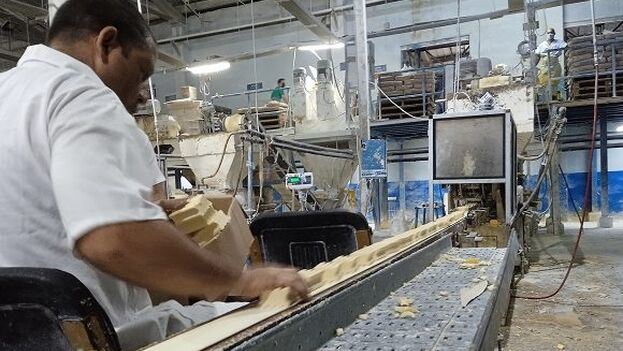
![]() 14ymedio, Juan Diego Rodríguez, Havana, 9 November 2022 — Soap is another of the basic products that are disappearing from Cuban stores. The few bars available are sold on the black market at prices that are unaffordable for most people: more than 90 pesos for laundry soap and 80 pesos for personal-use soap.
14ymedio, Juan Diego Rodríguez, Havana, 9 November 2022 — Soap is another of the basic products that are disappearing from Cuban stores. The few bars available are sold on the black market at prices that are unaffordable for most people: more than 90 pesos for laundry soap and 80 pesos for personal-use soap.
Luis’s neighbor spent two weeks asking him for help to get a bar. “She practically begged me to find one for her, because she hasn’t bathed in 15 days,” says this Centro Habana resident.
Luis usually buys a large number of bars, because when he gets to stores that only take payment in freely convertible money (MLC) “there’s a long line. At home we don’t use the rationed soap, which itches tremendously, but there are people who have to bathe with it,” Luis says.
The shortage of the product is mainly due to the poor production managed by the Government. The Basic Business Unit (UEB) Suchel Cetro, in Habana del Este, had plans to develop 13,383 tons of washing soap for this year, but in October it had only achieved 44.6% of the quota, with a little more than 5,978 tons.
The same difficulties are present in the production of toilet soap: the company had a plan of 10,200 tons this year, and it has only produced 4,970, tons, 47% of the goal. “The main cause is the increase in the price of the raw materials necessary for this product,” apologized Alexander Puig Varona, director of the UEB, in a post in Cubadebate where, according to the media, he sought to clarify the doubts of readers about the shortage of the product.
Cuba imports most of the raw materials it needs, mainly base soap chips, which, due to the pandemic, it has not been able to acquire in the amount required to boost manufacturing. Nor does it keep the Cuban chip plant operational, Puig Varona explained, because it’s “impossible” to bring in the tankers with the fat.
Given the shortage of antiseptic, in Guantánamo, the Labiofam company has resorted to substitute materials to make soap for humans and pets. An example of this is the Jatropha curcas, a plant imported from the Mexican state of Morelos, acquired with funding from the Swiss Agency for Development and Cooperation (COSUDE).
With four cups of its oil, 418 units were made, of 1 ounce each, in the minimum format of “hotel soap.” This production, which took 30 minutes, was allocated to health and veterinary services, the company reported on Facebook on September 19.
The production also includes a batch of soap made from neem, a plant native to India with medicinal properties. A production of 5,000 bags of 8 ounces of soap was planned for September.
Translated by Regina Anavy
____________
COLLABORATE WITH OUR WORK: The 14ymedio team is committed to practicing serious journalism that reflects Cuba’s reality in all its depth. Thank you for joining us on this long journey. We invite you to continue supporting us by becoming a member of 14ymedio now. Together we can continue transforming journalism in Cuba.
